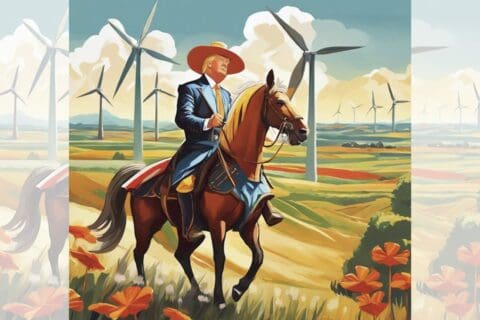
New Writing: The curtain has now come down on the Azerbaijan date of the COP show world tour. Writing for The Hub, the award-winning content platform curated by Mitsubishi Electric, Jim McClelland asks the question: Did the Conference of the Parties deliver for the climate; and is it still a driver for global finance?
Rolling out of Dubai and into Baku, the most-watched COP show in the world descended on Azerbaijan in November, bringing with it leaders and lobbyists by the plane-load.
A deal did get done, at the 11th hour, that pledged at least $300 billion a year to support developing nations in their efforts to manage and mitigate the impacts of climate change.
Although it tripled the previous annual commitment of just $100 billion, this sum fell well short of what had been wanted and expected in terms of climate funds: $1.3 trillion.
The summit did also sketch out an aspiration to secure additional monies from all actors including private finance to scale-up to that hoped-for total — but this lacked credibility in the eyes of many of the nations in need and was widely dismissed by critics as hot air.
So, how big a disappointment was the deal; and how damaging is it to confidence in COP?
It could have been Copenhagen
Well, whilst press and public might be hungry for results, appetites do not always get fed.
Down the years, the Conference of the Parties (COP) has sometimes failed to satisfy the demands around the table — take the (bad) example of COP15, in Copenhagen, 2009.
Far from a feast, the takeaway amounted to little more than a snack-sized Accord that was non-binding, accompanied by a lack of agreed targets, built on an absence of consensus.
The United States and China played a game of chicken where nobody won, and the Planet lost. The main was cold, the soufflé flat — everyone in the kitchen blamed everyone else.
So, it could have been worse…
Deep malaise and slow-motion NDCs
Unfortunately, the problem is… the result is not the real problem. The undercooked outcome in Baku merely presents as a symptom, not the cause of our climate concerns.
The state of Nationally Determined Contributions (NDCs) points to a deeper malaise.
The commitment to update NDCs sat at the core of the legally-binding Paris Agreement, adopted by all 196 Parties (195 countries plus the European Union) at COP21 in 2015.
The first update was required in 2020, the next is due in February 2025. Some countries, including the UK, and (COP30 host) Brazil, announced their updates in Baku, at COP29.
According to the Climate Action Tracker (CAT), though, only 69 nations have actually submitted their NDCs so far, leaving almost twice as many (126) yet to issue a proposal. In general, therefore, the global update process looks a lot like it is buffering, right now.
Of course, there is still time, but the alarm clock is beginning to tick, louder and louder.
Negative noise around EVs and ESG
Moreover, to place the climate talks in context, there are wider tell-tale signs of eco fatigue.
When it comes to the electric vehicle (EV) market, for instance, the boom in China is the big exception, whereas sales are slowing elsewhere, notably in the US and EU.
Wrongly for the most part, climate deniers blame the patchy pivot into EVs for job losses and stock drops at major automakers, such as Ford and Stellantis.
Over in the world of finance, the Association of Investment Companies (AIC) also reports that sector-wide adoption of environmental, social and governance criteria (ESG) fell for a third consecutive year in 2024, down from 66% in 2021, to just under half today (48%).
Of course there are still plenty of positives to be found for sustainability in business — witness the $1.3 billion incentive scheme for EVs in India, or the new regulations around transparency in ESG ratings in the EU. Overall, though the mood music is more downbeat.
The fact that hard-to-hit targets for 2025 and 2030 now loom large on the to-do list is a major stress factor for both public and private sectors alike — promises will be broken.
The real climate event turning eco-warriors into eco-worriers, though, has to be the re-election of Donald Trump — news of his White House return cast a long shadow in Baku.
Is this the Farewell Tour?
So, where does the COP show go from here? Is this the Farewell Tour?
To find the answer to that question, plus some more positive takeaways, even a few faint glimmers of hope, check out the full-length article, available to read for free on The Hub:
Was Baku the latest date on a Farewell Tour?
To view a back-catalogue of articles authored by Jim McClelland for ‘The Hub’, please see archive here.
SUSTMEME: Get the Susty Story Straight!






